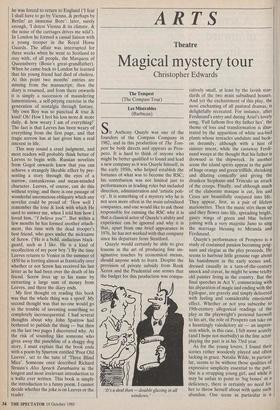ARTS
Theatre
Magical mystery tour
Christopher Edwards
The Tempest (The Compass Tour) Les Miserables (Barbican) Sit Anthony Quayle was one of the founders of the Compass Company in 1982, and in this production of The Tem- pest he both directs and appears as Pros- pero. It is hard to think of anyone who might be better qualified to found and lead a new company as it was Quayle hiinself, in the early 1950s, who helped establish the fortunes of what was to become the RSC; his contribution was not limited just to performances in leading roles but included direction, administration and 'artistic poli- cy'. It is something of a mystery why he is not seen more often in the main subsidised companies, and one would like to ask those responsible for running the RSC why it is that a classical actor of Quayle's ability and experience can be ignored and why it is that, apart from one brief appearance in 1976, he has not worked with that company since his departure from Stratford.
Quayle would certainly be able to give lessons in the art of producing fine im- aginative touches by economical means, should anyone wish to learn. Despite the provision of private subsidy from Rank Xerox and the Prudential one senses that the budget for this production was compa- 'It's a deal then — double glazing in all windows.' ratively small, at least by the lavish stan- dards of the two main subsidised houses. And yet the enchantment of this play, the most enchanting of all pastoral dramas, is delightfully recreated. For instance, after Ferdinand's entry and during Ariel's lovely song, 'Full fathom five thy father lies', the theme of loss and transformation is illus- trated by the apparition of white sea-bed plants whose tentacles undulate and beck- on dreamily, although with a hint of sinister intent, while the castaway Ferdi- nand weeps at the thought that his father is drowned in the shipwreck. In another scene the island spirits appear in the guise of huge orange and green triffids, shrinking and dilating comically and giving the drunken Stephano and Trinculo an attack of the creeps. Finally, and although much of the elaborate masque is cut, Iris and Ceres are beautifully conjured into life. They appear, first, as a pair of lifeless marionettes. Then the music stirs them up and they flower into life, spreading bright, gauzy wings of green and blue before joining with a very majestic Juno to sing the marriage blessing to Miranda and Ferdinand.
Quayle's performance of Prospero is a study of contained passion becoming poig- nant and elegiac as the play proceeds. He seems to harbour little genuine rage about his banishment in the early scenes and, dressed casually in a turn-of-the-century smock and cravat, he might be some tetchy old painter living in the country. But the final speeches in Act V, commencing with his abjuration of magic and ending with the Epilogue, are gravely and simply delivered with feeling and considerable emotional effect. Whether or not you subscribe to 19th-century allegorical readings of the play as the playwright's personal farewell to his art, the role of Prospero can take on a hauntingly valedictory air — an impres- sion which, in this case, I felt more acutely (and I hope not morbidly) as the fine actor playing the part is in his 73rd year. As for the young lovers, I found their scenes rather woodenly played and often lacking in grace. Natalie Wilde, in particu- lar, seems to be without those qualities of expressive simplicity essential to the part. She is a strapping young girl, and while it may be unfair to point to 'big bones' as a deficiency, there is certainly no need for her to throw herself about with quite such abandon. One scene in particular is a collector's item of misinterpretation. Fer- dinand has just staggered on bearing a large and heavy log. Miranda, who looms large next to Ferdinand even in her bare feet, offers to help in his labours. Gallantly he refuses and after exchanging fond words they are meant to part. This Miranda, however, cannot contain her affection and, like a hearty schoolgirl let out on exeat, she swoops upon her slender lover and lifts him clean off his feet with an ecstatic gurgle. Clearly she could chop down whole forests single-handed and one imagines Caliban had a real fight on his hands when he tried to molest her.
Clive Francis's Caliban is a hairy black monster with a greenish face and a promin- ent red tongue. He makes an impressive sight and the actor speaks the part superb- ly. The dignity and humour are almost too pronounced, though, and if there is a criticism it is that he develops these qual- ities at the expense of any real menace. The rest of the cast include the excellent Tony Britton as Alonso, Terence Wilton as Antonio and John Sharp as Stephano. In the main this is an unusually successful staging of a difficult play and I would recommend it. Over the next few months the company visits various cities around the country and in order to be of use to Spectator readers living in those places I set out a list showing where and when the production can be seen (in each case for a week): Plymouth: Theatre Royal, 21 October Bournemouth: Pavilion, 28 October Wolverhampton: Grand, 4 November Leeds: Grand, 11 November Glasgow: Theatre Royal, 18 November.
Two things at least are certain about Les Miserables. The first is that the critics have expressed alarm, disgust and displeasure that the RSC should lend itself (cynically, they would say) to a trite money-making venture. The second is that the production is sold out, and the auspices for a commer- cial transfer to all parts of the globe are correspondingly excellent. In these cir- cumstances low expectations are the best ones to hold. When it comes to modern musicals my expectations are of the very lowest. The spectacle tells us nothing much about Victor Hugo's novel. The songs are unmemorable save for one, quite rousing, beer-hall number which buzzed about in my head for a couple of hours after the performance. The story is sentimental and melodramatic, delivered by the cast with enormous gusto and told by the writers with great sententiousness. The plot is perfectly easy to follow with or without the detailed programme note explaining where the action shifts from Digne in 1815 to the Paris barricades in 1832, and who is con- sumed by thoughts of whom and why. And some of the sets by John Napier are stunning, notably the Paris slum which pivots spectacularly to become a barricade. If musicals are to your taste then this one is slicker than many and no more empty than most.



















































 Previous page
Previous page